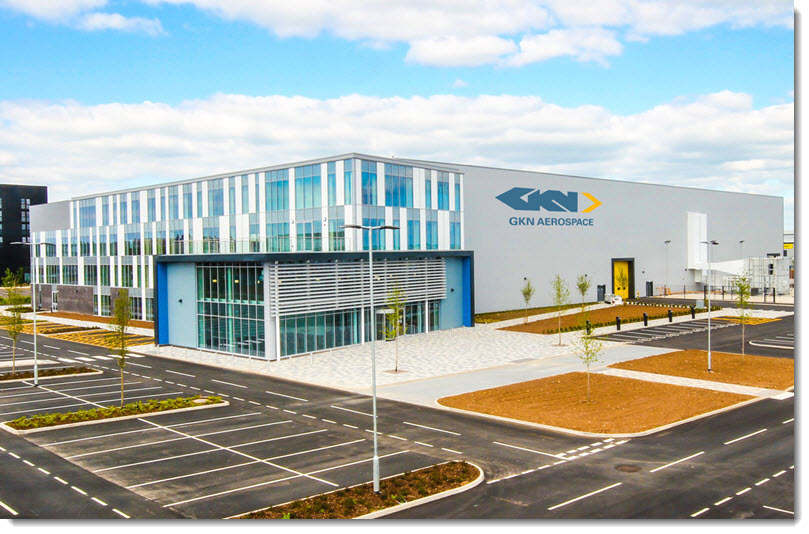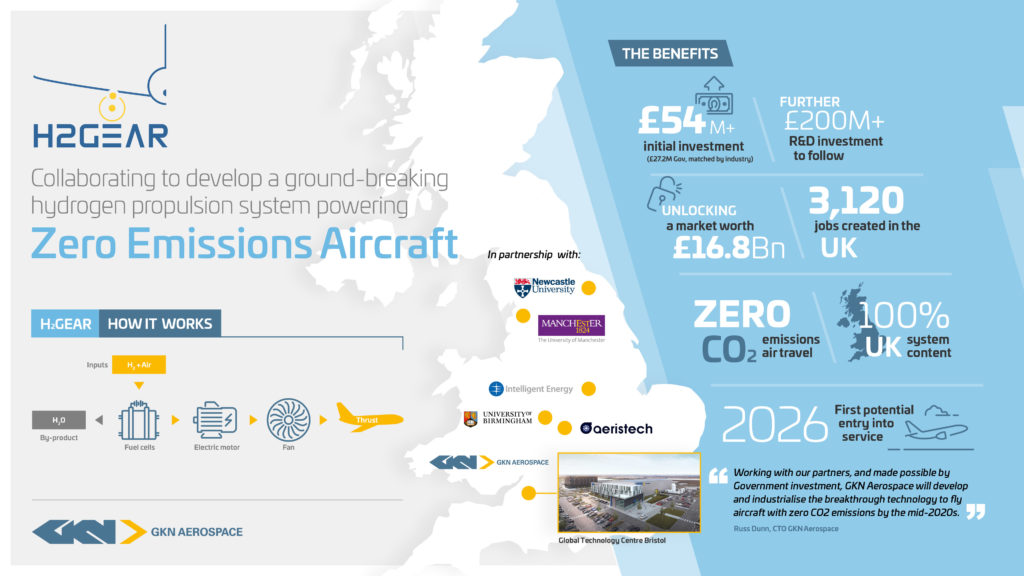
- £54M collaborative H2GEAR programme to push hydrogen technology and accelerate aerospace decarbonisation to zero emissions
- Public-private investment and collaboration aims to create more than 3,000 UK roles
- Entry-into-service of hydrogen-powered aircraft could be as early as 2026
- Project maintains GKN Aerospace’s position at forefront of next generation of sustainable aircraft technology
GKN Aerospace will lead a ground-breaking UK collaboration programme, called H2GEAR, to develop the company’s first hydrogen propulsion system for sub-regional aircraft.
Hydrogen is expected to play a key role in the decarbonisation strategy of aviation as it can power aircraft efficiently, leaving water as the only by-product. H2GEAR puts GKN Aerospace at the heart of the technology developments needed for the future of more sustainable aviation. The technology will first focus on significantly improving sub-regional aircraft hydrogen powered performance, in turn enabling applications on larger aircraft and longer journeys. The programme is supported by £27M of ATI funding, matched by GKN Aerospace and its industrial partners.
H2GEAR aims to develop a liquid hydrogen propulsion system for sub-regional aircraft that could be scaled up to larger aircraft. Liquid hydrogen is being converted to electricity within a fuel cell system. This electricity efficiently powers the aircraft, eliminating CO2 emissions. This would create a new generation of clean air travel, eliminating harmful CO2 emissions.
H2GEAR will reinforce the UK’s position at the forefront of aerospace technology research and development. GKN Aerospace will collaborate with Intelligent Energy, Aeristech, Newcastle University, The University of Manchester and University of Birmingham, throughout the programme, aiming to create more than 3,000 jobs in the next decade. The programme will be delivered from GKN Aerospace’s Global Technology Centre in Bristol, the company’s £32M brand-new collaborative space for research and development.
Russ Dunn, Chief Technology Officer for GKN Aerospace, said: “Hydrogen-powered aircraft offer a clear route to keep the world connected, with dramatically cleaner skies. The UK is at the forefront of this technology, and the H2GEAR project is an example of industry, academia and Government collaboration at its best. Working with our partners, and made possible by Government investment, GKN Aerospace will develop and industrialise the breakthrough technology to fly aircraft with zero CO2 emissions by the mid-2020s. This will not only create thousands of jobs, but it will keep the UK at the forefront of the next generation of cleaner air travel for decades to come.”
GKN Aerospace will use its long term experience and in-depth knowledge of electrical power systems and propulsion technology to accelerate the development of technology. The entry-into- service of the first hydrogen-powered aircraft could be as early as 2026.

H2GEAR partners:
Intelligent Energy (IE) will create new and innovative IP, know-how, skills and capabilities in the field of lightweighted fuel-cell stacks (utilising new materials, coatings and processes) and systems configured for zero emission flight propulsion requirements. These will be exploited through development by IE, and IE’s supply chain, of new fuel cell products and services in aviation application.
Aeristech was founded in 2006 and is a leading designer of advanced electric motor and control systems, winning the Queen’s Award for Enterprise: Innovation in 2020. Aeristech’s technology enables it to manufacture the world’s fastest accelerating and most power dense permanent magnet variable speed electric motors, which are ideal for applications where efficiency, power density and speed are essential. Its Leamington Spa headquarters feature laboratories, pilot production and test facilities.
Newcastle University
As a member of the Russell Group of research-intensive universities in the UK, Newcastle has a world-class reputation for research excellence in the fields of medicine, science and engineering, social sciences and the humanities.
Its academics are sharply focused on responding to the major challenges facing society today. Our research and teaching are world-leading in areas as diverse as health, culture, technology and the environment.
The Research Excellence Framework 2014 (REF) placed Newcastle University 16th in the UK for Research Power and the vast majority of our research was assessed to be world-leading or internationally excellent.
Newcastle University is committed to providing its students with excellent, research-led teaching delivered by dedicated and passionate teachers. This is reaffirmed by achieving the best possible outcome – a Gold Award – in the Teaching Excellence Framework (TEF).
The University of Manchester has a worldwide reputation for pioneering research in electrical networks and electrification of transport. The ambition of this project is to develop cryogenic technologies to create new electric drive concepts enabling power dense, highly efficient zero emission propulsion for aerospace.
University of Birmingham
The Centre for Fuel Cell and Hydrogen Research at the University of Birmingham will work on the future aviation fuel cell stack concept. The future stack will be based on the Novel Intermediate Temperature Polymer Electrolyte Fuel Cell (IT-PEFC) technology being developed at University of Birmingham. The IT-PEFC stack will offer an increase in power density, improved performance and simplified balance of plant.
The School of Chemical Engineering and the University of Birmingham hosts the UK’s leading Centre for Fuel Cell and Hydrogen Research. The centre is an integral part of the Birmingham Energy Institute and Energy Research Accelerator. Throughout the last decade, the significant contribution of the Centre towards the scientific and technology advancements in fuel cell and hydrogen research has been demonstrated through over 200 peer reviewed publications, and many contributions to international conferences. More than 50 highly trained graduates from the Centre have moved on to work in the field with industrial and academic institutions.
Media Enquiries Ahmad El-Kharouf [email protected]
Partner quotes
David Woolhouse, CEO at Intelligent Energy, said: “We have a very exciting programme of work over the next few years, including developing leading lightweight fuel cell modules for aerospace. This programme will see us develop the next generation of fuel cell technology and supports the growth of manufacturing right here in the East Midlands. We are planning to increase our manufacturing capability with a new state-of-the-art Gigafactory facility in the region, positioning the East Midlands as a centre of hydrogen fuel cell manufacturing in the UK. The entry-into-service of the first hydrogen-powered aircraft could be as early as 2026.”
Duncan Kerr, CEO of Aeristech, said: “This is a truly ground-breaking programme for hydrogen technology, bringing together some of the UK’s most established organisations for a cutting edge clean aviation solution. Aeristech’s world leading power dense and efficient compressor technology will play a vital role in powering GKN Aerospace’ first hydrogen propulsion system, helping to bring hydrogen-powered air travel closer to reality.”
Read the most up to date Fuel Cell and Hydrogen Industry news at FuelCellsWorks




